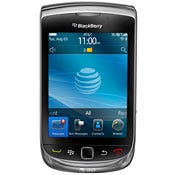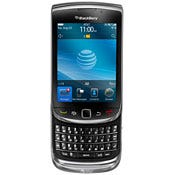BlackBerry's Torch Is On Fire
The long-awaited BlackBerry 6 operating system running on the new Torch 9800 phone is a major step forward for Research In Motion.
August 12, 2010


Blackberry Torch 9800
Blackberry Torch 9800 (click for larger image and image gallery)
iPhone and Android users cover your ears for a few minutes. [Pause.] If you are a BlackBerry user, you're going to want the Torch 9800, which comes out today. I've been using it for nearly a week alongside the Bold 9700, and while it took me a solid day to acquaint myself with the BlackBerry 6 operating system's new features, it's fantastic. It provides the best of both worlds (touch, keyboard), browses the web much faster, and provides a host of more modern-day smartphone features, including a bigger, content-friendly screen. It won't necessarily convert iPhone or Android lovers, but it might stay a few decisions to switch because it also offers the best of two other worlds: the enterprise class security and device control inherent in any BlackBerry, and a more user-friendly experience.
The Torch is slightly bigger and heavier than the Bold 9700, but not by as much as I had imagined (it's slightly shorter, but a little thicker and wider than the iPhone; and we're talking by millimeters here). The keyboards are identical. But in comparison to some of the popular smartphones today, the Torch comes up a little short. It's screen size, which is a key determinant in consuming content, is small at 3.2 inches (the iPhone, Droid X and others are bigger). Its resolution is also lower (360x480, showing 188 pixels per inch vs the iPhone with 326 ppi or the Droid X at 480 by 854 pixels). Still, this is a vast improvement. Also, its processor, running at 624MHz (RIM doesn't even list the speed in its spec sheets), is slower than the 1GHz processors of other phones. Even the Torch's battery life is comparatively lower (5.5 hours of talk time on GSM and 5.8 hours on UMTS vs 7 hours for the iPhone on 3G and 8 hours for the Droid X).
Also, many of the features found in the Torch, including touch gestures like pinch to zoom, swipes and double taps, and social network aggregation and geo-tagging on photos, have all been done elsewhere. You could say that Research In Motion is simply still catching up to everyone else on the end-user experience side.
However, the Torch is does catch up where it matters, and its comparative shortcoming are not likely to matter to BlackBerry fans; in fact, it will all seem like a buffet of dessert for those starved by the minimalist approach of the Bold, and the failed attempts of the Storm. Most important, the advancements in the Torch all still fit into a traditional, holistic BlackBerry experience. All the main buttons (escape, menu, send, end, trackpad) are still there. All of the apps still work (oddly, though, I cannot seem to find Pandora on the App Store yet).
First, the basics: a touch interface affords the ability to get away from nested folders of apps and downloads. Like other touch experiences, you get themed trays of your apps and content (frequently used apps, favorites, media, media, downloads, all), and those trays can be fully open (that is, populating the entire screen) or minimized in rows of four (so you can display up to 16 apps that take up the entire screen, or as few as four displayed across the bottom). As you would expect, you can swipe left and right between these trays. You can even take web pages and make shortcut icons that get displayed in a tray; you can create a shortcut from your contact app (for example, you can put your boss' contact icon directly on your screen for quick access).
Touch gestures on the home screen bring you to your configuration settings, allow you to get one-touch access to all your new messages (displayed in a single, stratified list), move items into different trays including favorites, and just generally get to almost everything quickly and more intuitively than before. A touch and hold of an icon brings up a mini-menu of options.

Blackberry Torch 9800
Blackberry Torch 9800 (click for larger image and image gallery)
The web browser is dramatically improved. It is now officially a webkit browser. A comparison done by Crackberry demonstrates how much faster it is on the Torch than on the Bold 9700, but Crackberry's comparison to browsers on other phones shows it to be a bit slower, likely because of the Torch processor. Still, BlackBerry users will feel like they've gone from a dirt road onto a major highway. The browser includes tabs, so you can easily and quickly look through the pages you have opened, as well as add book marks, add the site to your home screen, or share it (via e-mail, text, Facebook, Twitter and more). Naturally, viewing all of this on a bigger screen, in either portrait or landscape mode, with double-tap, pinch-to-zoom and other common gesture features finally turns browsing content to less of a nuisance; in fact, it's finally reasonable. I've spent hours on a variety of sites, including this one, ESPN, CNN, Google's RSS Reader, The Wall Street Journal and more.
The Torch has also finally gotten social. Its Social Feeds app brings together BlackBerry Messenger, Facebook, Twitter, AIM, Google Talk, MySpace, Windows Live Messenger and Yahoo Messenger. While that might seem overwhelming, you don't have to choose them all, and there are options to view each separately or to filter by social network (and probably very few people will use more than a handful of these). But culling all of these events into one place has been very handy. There is also an RSS feed within the app.
Research In Motion includes universal search as part of the entire BlackBerry experience, and it's pretty powerful. I don't yet have enough content on the device to truly give it a run for its money, but it has worked pretty well so far. Just start typing. That's it. As you start to type, it brings into view the apps where your search should take you -- say to a contact name (the contact app), or the subject of a message (the message app), or an actual web search (a "search Google" browser icon).
The device includes a 5 megapixel camera, which can also shoot video. The camera includes a flash, autofocus, image stabilization and geotagging (which didn't work all that well for me; while in Southern California, it showed that I was on the Central Coast, at least 150 miles north, and alternatively in Anaheim, which was miles away; sometimes, it got my location exactly right). It also provides different scene modes (sports, portraits, etc). A finger swipe lets you zoom in and out.
There's plenty more, including: the ability to add social network messages to your universal inbox, the ability to do group texting (will this lead to group sexting?) and group BBM for more collaboration, and included apps like BlackBerry podcasts, with a decent beginning lineup of podcasts to download. And yes, the phone part works just fine too. Of course, this is only available through AT&T. And it continues to support all of the mobile device management features supported by BES, BES Express, and BlackBerry Protect, depending on your carrier plan.
Fritz Nelson is the editorial director for InformationWeek and the Executive Producer of TechWebTV. Fritz writes about startups and established companies alike, but likes to exploit multiple forms of media into his writing.
Follow Fritz Nelson and InformationWeek on Twitter, Facebook, YouTube and LinkedIn:
Twitter @fnelson @InformationWeek @IWpremium
Facebook Fritz Nelson Facebook Page InformationWeek Facebook Page
YouTube TechWebTV
LinkedIn Fritz Nelson on LinkedIn InformationWeek
About the Author
You May Also Like






